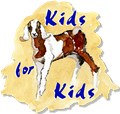Story
Kids for Kids helps families living in villages the desert of Darfur who have very little food to eat, sleep on the ground in small overcrowded huts, with the nearest drinking water miles away. Children have no shoes, there is no transport to reach market, and the hot desert sun brings scorching temperatures each day, and the desert can be bitterly cold at night. With two simple things, you can help improve a child's life for the coming year ahead: Goats and Trees!
Just one cup of Goats milk a day will stop a child from being malnourished after just three months. With milk to drink, children won't suffer the physical and cognitive impairment that comes with malnutrition. Not to mention, mothers can sell excess goats milk at market to earn an income for the family - the first she will have ever had. The key to the sustainability of our goat loan is giving five goats each to a family, and after two years, when the flock has grown, five goats are passed along to benefit another family. Truly the gift that keeps on giving!!
Goats can survive in the harshest conditions, but even they need shade! For 15 years, Kids for Kids has been planting trees - our first Baobabs are huge now! Trees provide shade from the hot desert sun, fruit to eat, and, most important of all, help to fight climate change. We plant over 14 different varieties of trees in Darfur including Neem, Moringa, Baobab, Nabuk, Citrus Fruit Trees, and Acacia Senegal. Darfur is at the forefront of global warming, where the desert is creeping south at a rate of three miles a year. Planting trees will help hold back the desert.
If we can reach our target, we can give the gift of goats and trees to Darfur, in a time when people are really struggling. Just £15 plants three trees outside straw huts in our villages to provide shade and fruit. Just £50 provides one Nanny Goat for children to have milk. Please will you help us provide goats for 200 families and trees for 105 villages?
Thank you so much! Please also share our page and let others know of the huge impact they can have on the lives of people who have so little.
 Campaign by
Campaign by 